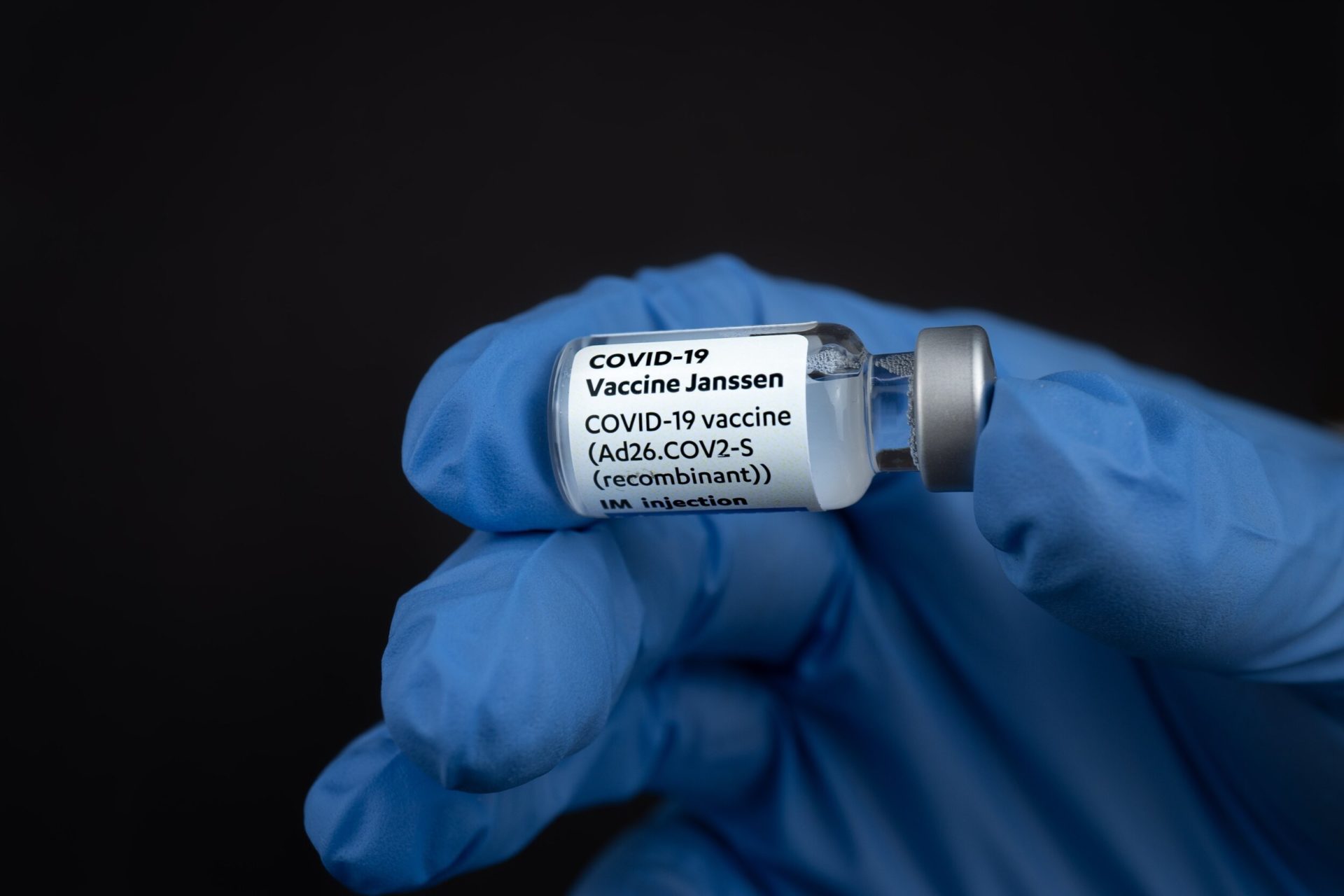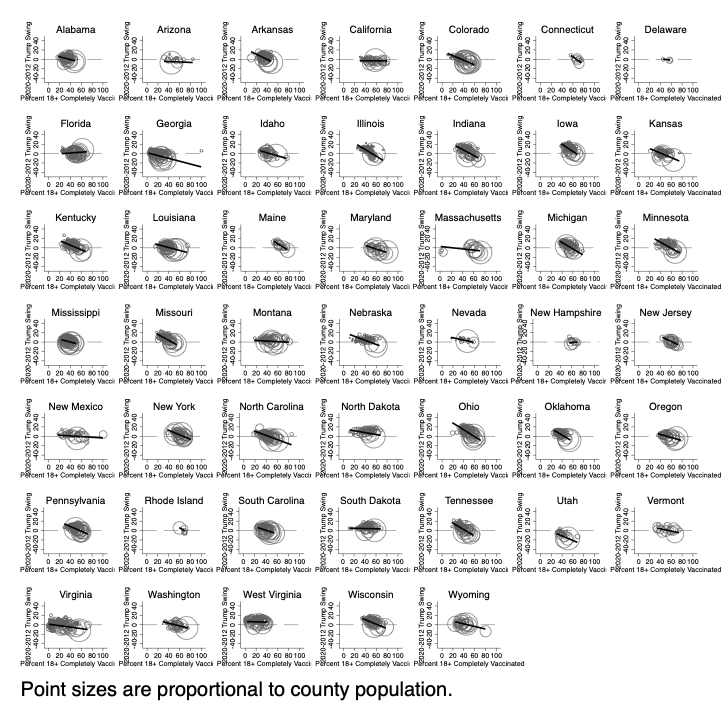
By July 20, 2021, 69.4% of the adult population had received the first dose of a COVID-19 vaccine in the United States. At first glance, the fact that 161.5 million Americans are fully vaccinated—including 89.7% of Americans over age 65—is remarkable, considering the time from development to testing to distribution was less than a year. Yet, one-third of Americans above the age of 12 (and all children under 12) are unvaccinated, and vaccination rates have slowed down significantly in recent weeks. The quick pace of vaccination experienced in February and March—when demand far outweighed supply—has lagged.
The country missed President Biden’s national target of 70% of the population by the 4th of July, but the failure is not a shared one. States like Vermont and Hawaii top the vaccination leaderboard, with 87% and 85% of their respective adult populations having received at least one dose, while states like Mississippi (50%) and Louisiana (53%) lag far behind. As the more contagious delta variant becomes the most prominent strain in the United States, hospitalizations and deaths are rising as the pandemic cases are now concentrated among the unvaccinated in these under-vaccinated states The Orange County Department of Health in Florida reported that 100% of COVID cases in its county in recent days have been among the unvaccinated. New surges, outbreaks, and sustained hotspots in under-vaccinated counties in states like Missouri, have even forced long-quiet political leaders like Tommy Tuberville and Steve Scalise to start endorsing vaccination.
How do we explain the pattern between vaccinated and unvaccinated Americans? Why would some be resistant or—in extreme cases—outright hostile to the idea of a highly effective vaccine that almost eliminates the risk of serious illness and hospitalization from COVID-19? The answer, quite simply, is partisan politics.
There is now a large partisan gap between the vaccinated and unvaccinated that is growing over time. Many eligible Americans are choosing not to get vaccinated and increasingly, those who choose to remain unvaccinated and unprotected identify as Republicans and live in Republican counties.
There is, in fact, a strong negative correlation across nearly every state in the union between county-level Trump vote share in 2020 and vaccination rates, measured using data maintained by the CDC. The graph below shows the relationship between the Trump vote during the 2020 election and the rates of vaccination by county in every state. The relationship is quite clear – places with more Trump voters have lower vaccination rates.
2020 Trump Support and Vaccination Rates, June 15, 2021

We also see the same patterns looking at surveys of individuals we conducted over the course of the pandemic. In April 2020, we asked 2,400 respondents on a nationally representative survey how likely they would be to get a vaccine for COVID 19 if it were available. As early as April, already one month into stay-at-home orders across the country, partisanship was a stronger determinant of who wanted a vaccine than income, education, race, or any other demographic factor. Democrats were more likely to stay that they definitely wanted a vaccine than were Republicans and non-partisans. A plurality (but not a majority) of Republicans and non-partisans expressed strong interest in a vaccine, but each group was substantially more likely to express some degree of vaccine hesitancy than were Democrats.
We asked this question of the same people again in April 2021 (excluding those who were already vaccinated) and partisanship was still the main driver of whether people wanted to get a vaccine. Among Democrats who had not been vaccinated yet, they had a 60% probability of saying that they were extremely likely to get vaccinated – this is twice as likely as Republicans and one and half times as likely as non-partisans.
There is nothing inherent in being a Republican that would lead someone to eschew vaccines. In fact, due in part to Operation Warp Speed—the billion dollars investment in researching, developing, and rolling out a vaccination under President Trump—Republicans could have claimed vaccinations as a signature Republican victory in the fight against COVID-19. Vaccines could have been touted as the Republican key to unlocking economic recovery. President Trump was vaccinated back in January 2021, but he chose not to do so publicly, like other elected officials in the US and around the globe who used their vaccinations to communicate the importance of vaccination more widely. Trump politicized vaccines early on, publicly raising baseless accusations against Pfizer by suggesting that they delayed positive vaccine trial results until after Election Day. The Republican Party could have embraced vaccinations as a central Republican achievement, but it chose another path.
The way party identification operates here is by serving as a catch-all for other social identities and values. For instance, the Republican Party does not formally maintain an anti-vaccine platform, but an individual who votes Republican may hold a “science skeptical” worldview. Conservative and Republicans put more emphasis on individual choices and freedom as values, and party leaders frame vaccination as a personal choice more than a community obligation. For people who are less trusting of government and science, a new vaccine is dismissed as something promoted by a president outside of their party – who many believe is not the legitimate president. This combination is enough to garner fear of the consequences of the vaccine more than the virus itself.
Another main driver of hesitancy is the cues from party leaders. Early on, President Trump and conservative media linked a Republican party identity to opposition to coronavirus mitigation measures like social distancing, masking, and later, vaccines. The former president was vaccinated prior to leaving the White House but did not do it publicly or do significant outreach to loyalists to convince them to trust it.
While some Republicans, like Governor Spencer Cox of Utah, were eager to promote vaccination and get his state to Biden’s 70% goals by the Fourth of July, others like Florida Governor Ron DeSantis sent mixed signals. While DeSantis himself was vaccinated with the single-shot J&J, he did not do so publicly like other governors. Moreover, his politics have buoyed anti-vaxxers efforts by preserving the “vaccination as personal choice” stance. He signed an executive order prohibiting vaccine passports, most notably, threatened to fine cruise ships that require passengers to be vaccinated.
The most extreme example comes from the Tennessee Department of Health, which halted vaccine outreach to kids for all diseases amid pressure from the GOP. This is the Republican party at the state level explicitly siding against vaccines.
Another major source of vaccine skepticism for conservatives is cable news. Fox News hosts like Tucker Carlson and Laura Ingraham question the need for the vaccine itself and government programs that could help bring vaccines to people’s homes. Carlson went so far as to describe Biden’s vaccination push as “the greatest scandal in my lifetime, by far.” This is consistent with the conservative media messaging early on that COVID-19 was no worse than the flu, and that the Democrats were using the threat of COVID-19 as a political power grab.
However, there are signs that the skepticism in conservative media is starting to shift. Recently, Fox News hosts Steve Doocy and Sean Hannity suddenly started advocating for more vaccination.
To be sure, partisanship is not the only reason for low vaccination rates across the country. Issues of access explain a good deal about why the vaccination rates of racial minority groups like Black, Hispanic, and Asian Americans are lower than those of whites, even as these groups suffer disproportionate deaths from the virus.
Access to the vaccine is also another important issue, but comparatively, it might be a more straightforward fix. If people cannot easily get to vaccination sites, need language help to fill out paperwork, or fear the side effects will keep them from paid work, there are policy fixes available.
The human costs required to end the pandemic through mass isolation or herd immunity are enormous, and the only serious public health response is to distribute the vaccine widely. To fix the hesitancy due to partisanship, Republican leadership at the state and national level need to align the values of the party with vaccination to end this pandemic permanently. Perhaps more importantly, the content of this messaging must be centered on the narrative of consulting your family doctor, which keeps the endorsement ideologically consistent with conservative values like individual choice and distrust of government authority. More of that type of messaging and outreach will be needed in the months ahead.

Shan Kushner Gadarian
Shana Kushner Gadarian is Professor of Political Science at the Maxwell School, Syracuse University. Her research interests are in American politics, political psychology and political communication. She is the co-author of Anxious Politics: Democratic Citizenship in a Threatening World and the forthcoming Pandemic Politics.

Sara Wallace Goodman
Sara Wallace Goodman is Associate Professor of Political Science at the University of California, Irvine (UCI), specializing in democratic citizenship, political identity, and immigrant integration. She is the author of the forthcoming Citizenship in Hard Times: How Ordinary People Respond to Democratic Threat (Cambridge University Press), co-author of the forthcoming Pandemic Politics (Princeton University Press), and author of Immigration and Membership Politics in Western Europe (Cambridge University Press, 2014). More information can be found on her website.

Thomos Pepinsky
Thomas Pepinsky is the Walter F. LaFeber Professor of Government and Public Policy at Cornell University, and Nonresident Senior Fellow at the Brookings Institution. His current research interests include the politics of COVID-19 in the United States, and the political economy of identity around the world.






